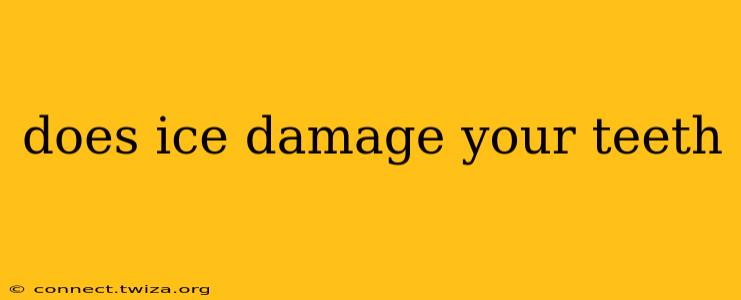Does Ice Damage Your Teeth? A Chilling Truth
The short answer is: yes, ice can damage your teeth. While enjoying a refreshing ice cube on a hot day might seem harmless, the extreme cold can actually cause several problems for your dental health. This article will delve into the potential damage, explaining why and how ice can negatively impact your teeth, and offer some helpful tips for enjoying icy treats safely.
What Happens When You Chew Ice?
Chewing ice exposes your teeth to extremely low temperatures, potentially leading to thermal shock. This rapid temperature change can cause the enamel, the outermost layer of your teeth, to crack or become weakened. Over time, this weakening makes your teeth more susceptible to cavities, sensitivity, and even fractures. Think of it like repeatedly exposing glass to extreme temperature changes – it eventually becomes brittle and prone to breaking.
Can Ice Cause Tooth Fractures?
Absolutely. Ice is incredibly hard, and biting down on it with force can easily cause cracks or even chips in your teeth, especially if you have pre-existing weaknesses or fillings. These fractures can be painful and require dental intervention, sometimes leading to extensive repairs or even tooth extractions. The risk is particularly high for those with weakened enamel due to other factors, such as acidic drinks or poor oral hygiene.
Is Ice Bad for Sensitive Teeth?
For those already experiencing tooth sensitivity, ice is a definite no-go. The extreme cold can exacerbate existing sensitivity, causing sharp pain when you consume cold beverages or foods – including ice. This is because the cold triggers the nerves within your teeth, leading to discomfort. If you suffer from sensitive teeth, avoiding ice is crucial to manage your pain levels.
How Can I Protect My Teeth From Ice Damage?
Fortunately, you don't have to completely eliminate icy treats from your life. Here are some practical steps to minimize the risk:
-
Limit Ice Consumption: The less ice you chew, the lower the risk of damage. Consider sipping on cold drinks rather than chewing on ice cubes.
-
Choose Smaller Ice Cubes: Smaller cubes exert less force on your teeth, reducing the likelihood of cracks or fractures.
-
Use a Straw: If you're drinking a cold beverage with ice, using a straw can help minimize direct contact between the ice and your teeth.
-
Maintain Good Oral Hygiene: A strong, healthy mouth is better equipped to withstand the effects of cold temperatures. Brush and floss regularly and see your dentist for regular checkups.
-
Address Existing Dental Problems: If you have any existing dental issues, such as sensitive teeth or weak enamel, it's crucial to address them promptly. Your dentist can recommend treatments and provide advice on protecting your teeth.
What are the long-term effects of chewing ice?
The long-term effects of regularly chewing ice can range from minor discomfort to significant dental problems. Repeated exposure to extreme cold can lead to chronic tooth sensitivity, increased risk of cavities, and eventually more extensive damage like fractures requiring fillings, crowns, or root canals. In the worst-case scenario, severe damage could lead to tooth loss.
By understanding the potential dangers and following these simple precautions, you can continue to enjoy cold drinks without compromising your oral health. If you have any concerns about your teeth or suspect damage from chewing ice, consult your dentist immediately for a professional assessment.
